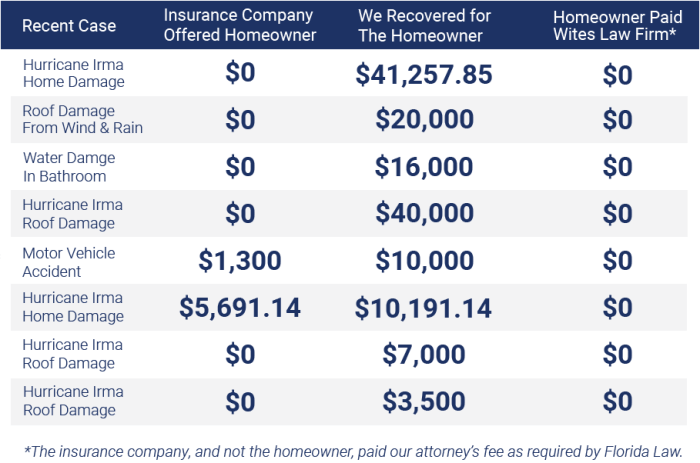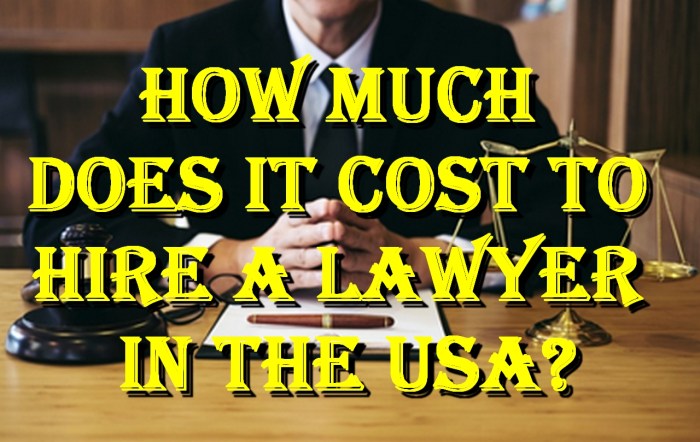How much does it cost to hire a lawyer? It’s a question that can keep you up at night, especially if you’re facing a legal challenge. The cost of legal services can vary widely depending on a number of factors, including the type of case, the lawyer’s experience, and the location of the law firm.
But with careful planning and research, you can find an affordable lawyer who can help you get the justice you deserve.
In this article, we’ll explore the factors that affect legal fees and provide tips on how to find an affordable lawyer. We’ll also discuss alternative options to hiring a lawyer, such as mediation and arbitration.
Legal Fees

Legal fees can vary significantly depending on several factors, including the type of case, the complexity of the legal issues involved, the experience and reputation of the attorney, and the location of the law firm.
The most common types of legal fees are hourly rates and flat fees. Hourly rates are charged by the hour, and the amount charged will vary depending on the attorney’s experience and the complexity of the case. Flat fees are a fixed amount that is agreed upon in advance, regardless of the number of hours spent on the case.
Contingency Fees
In some cases, attorneys may agree to work on a contingency fee basis. This means that the attorney will not charge a fee unless the client wins the case. If the client wins, the attorney will receive a percentage of the settlement or judgment.
Ethical Considerations
Attorneys are required to follow ethical rules when setting legal fees. These rules include:
- The fee must be reasonable and not excessive.
- The fee must be disclosed to the client in writing before the attorney begins work.
- The fee must be based on the attorney’s experience, skill, and reputation.
Retainer Fees
Retainer fees are a type of payment that is made to a lawyer in advance of providing legal services. They are typically used in situations where the client anticipates needing ongoing legal assistance over a period of time, such as in the case of a complex legal matter or a long-term business relationship.
There are several advantages to using retainer fees. First, they can help to ensure that the client has access to legal services when they need them. Second, they can help to budget for legal expenses, as the client will know in advance how much they will be paying for legal services.
Third, retainer fees can help to build a strong relationship between the client and the lawyer, as the lawyer will be more likely to be invested in the client’s case if they have already been paid a retainer.
Structure of Retainer Fees
Retainer fees are typically structured in one of two ways. In the first structure, the client pays a flat fee to the lawyer for a specific period of time, such as a month or a year. In the second structure, the client pays a retainer fee into a trust account, and the lawyer then bills against the retainer as services are provided.
Any unused funds in the trust account are refunded to the client at the end of the retainer period.
Use of Retainer Fees
Retainer fees can be used for a variety of legal services, including:
- Legal advice
- Document review
- Negotiations
- Court appearances
- Trial preparation
Retainer fees are a valuable tool that can help clients to access legal services and budget for legal expenses. They can also help to build a strong relationship between the client and the lawyer.
Contingency Fees
Contingency fees are a type of payment arrangement in which a lawyer agrees to represent a client in exchange for a percentage of any money that the client recovers in the case. This type of fee arrangement is often used in personal injury cases, where the client may not have the financial resources to pay for a lawyer upfront.
There are several advantages to contingency fee arrangements. First, they allow clients to access legal representation without having to pay any money upfront. Second, they provide an incentive for lawyers to work hard to win their clients’ cases, as they will only be paid if the client recovers money.
However, there are also some disadvantages to contingency fee arrangements. First, they can be more expensive than other types of fee arrangements, as the lawyer will typically take a percentage of the client’s recovery. Second, they can create a conflict of interest between the lawyer and the client, as the lawyer may be tempted to settle the case for less than the client deserves in order to get paid sooner.
Factors to Consider When Deciding Whether to Enter into a Contingency Fee Agreement
- The strength of your case
- The amount of money you are likely to recover
- The lawyer’s experience and track record
- The lawyer’s fees
- Your financial situation
Pro Bono Services
Pro bono services provide free legal assistance to individuals or organizations who cannot afford to hire an attorney. These services are typically offered by attorneys who volunteer their time and expertise to help those in need.
Who Qualifies for Pro Bono Services?
Eligibility for pro bono services varies depending on the organization providing the assistance. Generally, individuals or organizations with low incomes, limited assets, and compelling legal needs may qualify. Some organizations may also consider factors such as the complexity of the case, the potential impact of the case on the community, and the availability of other legal resources.
Legal Aid
Legal aid programs are government-funded initiatives that provide free or low-cost legal services to individuals who meet certain eligibility criteria. These programs are designed to ensure that everyone has access to legal representation, regardless of their financial means.
To be eligible for legal aid, individuals must typically meet income and asset requirements. The specific eligibility criteria vary from program to program, but generally, individuals must be at or below a certain income level and have limited assets.
Scope of Services
Legal aid organizations typically provide a wide range of services, including:
- Advice and counseling on legal matters
- Representation in court
- Help with legal documents
- Negotiation with creditors or other parties
- Advocacy on behalf of clients
Legal aid organizations can provide assistance with a variety of legal issues, including:
- Family law
- Housing law
- Consumer law
- Employment law
- Criminal defense
Legal aid is an essential service that helps to ensure that everyone has access to justice. If you are facing a legal problem and cannot afford to hire a lawyer, you should contact a legal aid organization to see if you are eligible for assistance.
Flat Fees vs. Hourly Fees
Flat fees and hourly fees are two common fee structures used by lawyers. Each structure has its own advantages and disadvantages, so it’s important to understand the differences before making a decision.
Flat fees are a fixed amount that you pay your lawyer for a specific service, such as drafting a will or representing you in a divorce. The advantage of a flat fee is that you know exactly how much you will be paying upfront.
This can be helpful for budgeting purposes and can give you peace of mind. However, flat fees can be more expensive than hourly fees if the case is complex or takes longer than expected.
Hourly fees are charged by the hour, and you will be billed for the actual time that your lawyer spends working on your case. The advantage of hourly fees is that you only pay for the time that your lawyer actually works on your case.
This can be less expensive than a flat fee if the case is simple or does not take very long. However, hourly fees can be unpredictable, and you may end up paying more than you expected if the case is complex or takes longer than expected.
Choosing the Right Fee Structure
The best fee structure for you will depend on the specific circumstances of your case. If you have a simple case that is likely to be resolved quickly, an hourly fee may be a good option. If you have a complex case that is likely to take a long time to resolve, a flat fee may be a better option.It is important to discuss the fee structure with your lawyer before hiring them.
This will help you understand the costs involved and make an informed decision about which fee structure is right for you.
Average Cost of Hiring a Lawyer
The cost of hiring a lawyer can vary significantly depending on the jurisdiction, legal practice area, and experience of the attorney. Here’s a breakdown of the average cost of hiring a lawyer in different states and countries: United States
Criminal Defense
$1,000-$5,000
Family Law
$1,500-$3,000
Corporate Law
$2,000-$5,000 United Kingdom
Criminal Defense
£1,000-£5,000
Family Law
£1,500-£3,000
Corporate Law
£2,000-£5,000 Canada
Criminal Defense
$1,000-$4,000
Family Law
$1,500-$2,500
Corporate Law
$2,000-$4,000 Australia
Criminal Defense
$1,000-$4,000
Family Law
$1,500-$2,500
Corporate Law
$2,000-$4,000
Factors Contributing to Variations in Legal Fees
Several factors contribute to variations in legal fees across jurisdictions, including:
Cost of living
The cost of living in a particular area can affect the cost of legal services. Lawyers in areas with a higher cost of living tend to charge higher fees.
Demand for legal services
The demand for legal services can also affect fees. Lawyers in areas with a high demand for legal services may charge higher fees than lawyers in areas with a lower demand.
Availability of legal aid
The availability of legal aid can also affect the cost of hiring a lawyer. In areas where legal aid is available, low-income individuals may be able to obtain legal services for free or at a reduced cost.
Factors Affecting the Cost of Legal Services
The cost of legal services can vary depending on several factors, including the complexity of the case, the experience of the lawyer, and the geographic location. Here’s a table that provides a range of estimated costs for different legal services, taking into account these factors:
Disclaimer:The costs listed below are estimates and may vary depending on individual circumstances.
| Legal Service | Average Hourly Rate | Estimated Cost Range |
|---|---|---|
| Consultation | $100-$300 | $100-$500 |
| Document Review | $150-$400 | $150-$1,000 |
| Letter Drafting | $200-$500 | $200-$1,500 |
| Negotiation | $250-$750 | $250-$2,500 |
| Trial Preparation | $300-$1,000 | $300-$5,000 |
| Trial Representation | $400-$1,500 | $400-$10,000 |
Negotiating Legal Fees

Negotiating legal fees can be a daunting task, but it’s important to remember that you have the right to discuss and negotiate the cost of your legal services. Here are some tips to help you get the best possible deal:
Factors to Consider When Negotiating a Fee Agreement
* The complexity of your case
- The experience and reputation of the attorney
- The attorney’s fees for similar cases
- Your budget
Types of Fee Agreements
There are three main types of fee agreements:* Contingency fee agreements: In a contingency fee agreement, the attorney only gets paid if you win your case. The attorney’s fee is usually a percentage of the amount you recover.
Flat fee agreements
In a flat fee agreement, you pay the attorney a fixed amount for their services. This type of agreement is usually used for cases that are relatively simple and straightforward.
Hourly fee agreements
In an hourly fee agreement, you pay the attorney an hourly rate for their services. This type of agreement is usually used for cases that are complex and time-consuming.Each type of fee agreement has its own pros and cons. It’s important to discuss the different types of fee agreements with your attorney and decide which one is right for you.
Sample Fee Agreement
A fee agreement is a contract between you and your attorney that Artikels the terms of your representation. It should include the following information:* The type of fee agreement
- The amount of the fee
- The payment schedule
- The attorney’s responsibilities
- Your responsibilities
It’s important to read the fee agreement carefully before you sign it. Make sure you understand all of the terms and conditions.
Negotiating a Contingency Fee Agreement
Contingency fee agreements are common in personal injury cases. In a contingency fee agreement, the attorney only gets paid if you win your case. The attorney’s fee is usually a percentage of the amount you recover.When negotiating a contingency fee agreement, you should consider the following factors:* The likelihood of success in your case
- The amount of damages you are seeking
- The attorney’s experience and reputation
Negotiating a Flat Fee Agreement
Flat fee agreements are common in cases that are relatively simple and straightforward. In a flat fee agreement, you pay the attorney a fixed amount for their services.When negotiating a flat fee agreement, you should consider the following factors:* The complexity of your case
- The amount of time the attorney is likely to spend on your case
- The attorney’s experience and reputation
Negotiating an Hourly Fee Agreement
Hourly fee agreements are common in cases that are complex and time-consuming. In an hourly fee agreement, you pay the attorney an hourly rate for their services.When negotiating an hourly fee agreement, you should consider the following factors:* The complexity of your case
- The amount of time the attorney is likely to spend on your case
- The attorney’s experience and reputation
Getting a Free Consultation with an Attorney
Many attorneys offer free consultations. This is a great opportunity to meet with an attorney and discuss your case. During the consultation, you can ask the attorney about their fees and payment options.
Finding an Attorney Who Is Willing to Negotiate on Fees
Not all attorneys are willing to negotiate on fees. However, there are some attorneys who are willing to work with you to find a payment plan that fits your budget.If you are having trouble finding an attorney who is willing to negotiate on fees, you can contact your local bar association.
The bar association may be able to provide you with a list of attorneys who are willing to work with you on a payment plan.
Checklist of Things to Keep in Mind When Negotiating Legal Fees
* The complexity of your case
- The experience and reputation of the attorney
- The attorney’s fees for similar cases
- Your budget
- The type of fee agreement
- The amount of the fee
- The payment schedule
- The attorney’s responsibilities
- Your responsibilities
Hidden Costs of Hiring a Lawyer: How Much Does It Cost To Hire A Lawyer

When considering the cost of hiring a lawyer, it’s crucial to be aware of potential hidden expenses beyond the legal fees. These additional costs can significantly impact your overall budget.
Court Fees
Court fees cover various expenses associated with filing and processing legal documents, such as filing fees, service of process fees, and trial preparation costs. These fees vary depending on the jurisdiction and the nature of the case.
Expert Witness Fees
In complex cases, expert witnesses may be necessary to provide specialized knowledge or testimony. Their fees can be substantial, especially if they require extensive research or preparation.
Travel Expenses
If the lawyer needs to travel for depositions, hearings, or trial, you may be responsible for their travel expenses, including transportation, accommodation, and meals.
Budgeting for Legal Fees
Hiring a lawyer can be a significant financial undertaking. To avoid unexpected expenses and manage costs effectively, it’s crucial to budget for legal fees and explore financing options.
Negotiating Legal Fees and Payment Arrangements:
- Discuss fees openly with your lawyer and negotiate a payment plan that suits your financial situation.
- Consider flat fees for specific services or hourly rates for ongoing representation.
- Negotiate payment terms, such as monthly installments or retainer fees.
Financing Legal Expenses:
| Financing Option | Pros | Cons |
|---|---|---|
| Loans | Provides access to funds upfront; fixed monthly payments. | High interest rates; affects credit score. |
| Payment Plans | Flexible payment options; no interest charges. | May require a down payment; can limit your access to funds. |
| Credit Cards | Quick and easy access to funds; convenient for small expenses. | High interest rates; can quickly accumulate debt. |
Sample Budget for Legal Expenses:
- Initial consultation: $100-$500
- Document review: $200-$1,000
- Letter writing: $150-$500 per letter
- Negotiation: $300-$1,500 per hour
- Trial representation: $5,000-$50,000
Tips for Reducing Legal Expenses:
- Negotiate fees with your lawyer.
- Use free or low-cost legal services, such as legal aid or online resources.
- Represent yourself in court for simple legal matters.
- Seek out lawyers with sliding scale fees or pro bono services.
Alternatives to Hiring a Lawyer

Hiring a lawyer can be expensive, and it’s not always necessary. There are a number of alternatives to hiring a lawyer that can be more affordable and just as effective.
Mediation
Mediation is a process in which a neutral third party helps disputing parties reach an agreement. Mediation can be used to resolve a wide range of legal disputes, including family law disputes, contract disputes, and personal injury claims.The benefits of mediation include:* It is less expensive than hiring a lawyer.
- It is less adversarial than going to court.
- It can be more efficient than going to court.
- It can help to preserve relationships between the parties.
The limitations of mediation include:* It is not always successful.
- The mediator may not be impartial.
- The parties may not be willing to compromise.
Arbitration
Arbitration is a process in which a neutral third party makes a binding decision on a legal dispute. Arbitration is often used to resolve business disputes, but it can also be used to resolve other types of disputes, such as family law disputes and personal injury claims.The benefits of arbitration include:* It is less expensive than going to court.
- It is less adversarial than going to court.
- It can be more efficient than going to court.
- The decision of the arbitrator is binding on the parties.
The limitations of arbitration include:* It is not always successful.
- The arbitrator may not be impartial.
- The parties may not be willing to give up their right to a trial.
Online Legal Services
Online legal services offer a variety of legal services, such as document review, legal advice, and representation in court. Online legal services can be more affordable than hiring a lawyer, and they can be more convenient.The benefits of online legal services include:* They are less expensive than hiring a lawyer.
- They are more convenient than hiring a lawyer.
- They can provide access to legal services in remote areas.
The limitations of online legal services include:* They may not be able to provide the same level of service as a lawyer.
- They may not be able to handle complex legal issues.
- They may not be able to represent you in court.
Online Legal Fee Estimators: Accuracy and Limitations

Online legal fee estimators provide a convenient way to get a rough estimate of the potential costs associated with hiring a lawyer. These tools use various factors, such as the type of legal issue, the location, and the experience of the attorney, to generate an estimate.
However, it’s important to note that these estimates are not always accurate and should not be relied upon as a substitute for consulting with an attorney.
Accuracy of Online Legal Fee Estimators, How much does it cost to hire a lawyer
The accuracy of online legal fee estimators can vary depending on the specific tool used and the information provided. Some estimators may be more accurate than others, and it’s important to choose a reputable tool that has been developed by experienced legal professionals.
It’s also important to keep in mind that these estimators are only able to provide a general estimate. The actual cost of legal services can vary significantly depending on a number of factors, such as the complexity of the case, the attorney’s experience, and the location.
Importance of Consulting with an Attorney
While online legal fee estimators can be a helpful starting point, it’s always important to consult with an attorney to get an accurate estimate of the potential costs. An attorney can assess the specific details of your case and provide you with a more personalized estimate.
Consulting with an attorney also allows you to discuss your payment options and explore ways to reduce the cost of legal services. Many attorneys offer payment plans and other flexible billing options to make legal services more affordable.
Table Comparing Online Legal Fee Estimators
| Estimator | Accuracy | Features | Cost |
|---|---|---|---|
| LegalZoom | Moderate | Basic fee estimates, attorney profiles, document preparation | Free |
| Avvo | Moderate | Fee estimates, attorney reviews, legal articles | Free |
| Nolo | Good | Detailed fee estimates, legal resources, attorney directory | $49.99 per month |
| Lawyers.com | Good | Fee estimates, attorney profiles, legal news | Free |
| Rocket Lawyer | Moderate | Fee estimates, document preparation, legal advice | $39.99 per month |
Ethical Considerations in Legal Fees
Lawyers have ethical obligations to ensure fairness and transparency in their billing practices. The American Bar Association’s Model Rules of Professional Conduct require lawyers to:
- Charge reasonable fees.
- Provide clients with a written fee agreement before beginning work.
- Keep accurate records of time spent on a client’s case.
- Bill clients in a timely and understandable manner.
- Avoid conflicts of interest that could affect their ability to provide objective legal advice.
Importance of Transparency and Fairness
Transparency and fairness in legal billing practices are essential for maintaining public trust in the legal profession. When clients understand how their fees are calculated and how their money is being used, they are more likely to be satisfied with the services they receive.
Ethical billing practices also help to prevent lawyers from taking advantage of their clients.
Closing Summary
The cost of hiring a lawyer can be a significant expense, but it’s important to remember that legal representation can be essential to protecting your rights and interests. By carefully considering the factors that affect legal fees and by exploring alternative options, you can find an affordable lawyer who can help you achieve your legal goals.
Quick FAQs
How much does it cost to hire a lawyer?
The cost of hiring a lawyer can vary widely depending on a number of factors, including the type of case, the lawyer’s experience, and the location of the law firm. However, you can expect to pay between $100 and $500 per hour for legal services.
What are some tips for finding an affordable lawyer?
There are a number of things you can do to find an affordable lawyer, including:
- Get referrals from friends or family members.
- Contact your local bar association for a list of pro bono or low-cost legal services.
- Look for lawyers who offer sliding scale fees or payment plans.
What are some alternative options to hiring a lawyer?
There are a number of alternative options to hiring a lawyer, including:
- Mediation
- Arbitration
- Online legal services